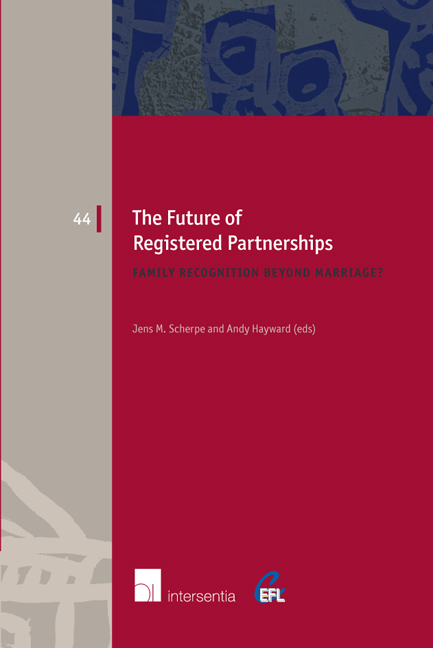Book contents
- Frontmatter
- Foreword
- Preface
- Contents
- List of Contributors
- The Future of Registered Partnerships: An Introduction
- Questionnaire
- Part I Registered Partnerships as a Functional Equivalent to Marriage
- Registered Partnerships in Denmark
- Registered Partnerships in Norway
- Registered Partnerships in Sweden
- Registered Partnerships in Iceland
- Part II Registered Partnerships as an Alternative to Marriage
- Part III Registered Partnerships in a Time of Transition
- Part IV Alternative Models for Registered Partnerships: Beyond Conjugality, Beyond Formality
- Part V Registered Partnerships, Discrimination and Human Rights
- Part VI Comparative Perspective and Conclusions
- Index
- European Family Law Series
Registered Partnerships in Sweden
from Part I - Registered Partnerships as a Functional Equivalent to Marriage
Published online by Cambridge University Press: 22 September 2018
- Frontmatter
- Foreword
- Preface
- Contents
- List of Contributors
- The Future of Registered Partnerships: An Introduction
- Questionnaire
- Part I Registered Partnerships as a Functional Equivalent to Marriage
- Registered Partnerships in Denmark
- Registered Partnerships in Norway
- Registered Partnerships in Sweden
- Registered Partnerships in Iceland
- Part II Registered Partnerships as an Alternative to Marriage
- Part III Registered Partnerships in a Time of Transition
- Part IV Alternative Models for Registered Partnerships: Beyond Conjugality, Beyond Formality
- Part V Registered Partnerships, Discrimination and Human Rights
- Part VI Comparative Perspective and Conclusions
- Index
- European Family Law Series
Summary
HISTORY AND BACKGROUND
BASIC STRUCTURES OF THE LAW ON ADULT RELATIONSHIPS
Same-sex marriage was introduced in Sweden in 2009. Between 1995 and 2009 there were two types of formalised unions. There was marriage, reserved for couples of the opposite sex, and registered partnership, reserved for couples of the same sex. By 2009, after several law reforms which are described below, the two institutions – marriage and registered partnership – in principle provided the same legal effects. The Registered Partnership Act (in Swedish, Lagenom registrerat partnerskap 1994:1117) was repealed when the Marriage Code (in Swedish, Ä ktenskapsbalken 1987:230) became gender-neutral. Couples already living in a registered partnership can choose to remain as registered partners or convert their partnership into a marriage. Conversion is achieved either through a marriage ceremony or by a written application to the Swedish Tax Agency, more precisely to the division in charge of population records. The Registered Partnership Act continues to apply to couples who remain registered but it is no longer possible to register a new partnership under Swedish law.
In Sweden, informal relationships, i.e. unmarried couples living together, are subject to rules laid down in a special Act, namely the Cohabitation Act (in Swedish, Sambolagen 2003:376). However, the substantial content of this Act was no novelty in 2003. A special Act on division of cohabitants’ property was introduced in Sweden in 1987. In fact, in 1987, two Acts, similar in substance, were introduced, one governing cohabitation outside of marriage between couples of the opposite sex and the other governing couples of the same sex. The main purpose of the 2003 enactment was to introduce one gender-neutral Act for informal relationships.
Unlike the Marriage Code and the Registered Partnership Act, the Cohabitation Act of 2003 applies by default. This means that there is no registration of unmarried cohabitants in Sweden and no official ceremony where the two individuals explicitly consent to entering into the union. The Act applies in respect of ‘ two persons living together in a relationship, on a permanent basis and sharing a household.’ The basic idea behind the Cohabitation Act is to grant the financially weaker party of a cohabiting relationship a minimum level of economic protection when the relationship ends.
- Type
- Chapter
- Information
- The Future of Registered PartnershipsFamily Recognition Beyond Marriage?, pp. 71 - 100Publisher: IntersentiaPrint publication year: 2017



